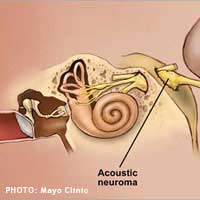Acoustic Neuroma: Benign Tumour from Auditory Nerve

What Is An acoustic Neuroma? An acoustic neuroma is a term given when there is a benign tumour present, which has stemmed from the lining of the auditory nerve of the central nervous system.This nerve, also called the vestibular nerve helps us to achieve a sense of balance and gives us our ability to hear sounds.It is normally a slow growing tumour, but as it can compress the nerve, it normally needs active treatment in order to prevent conditions from worsening.
Signs And Symptoms
As the tumour grows, it can compromise and compress the nerve, causing hearing impairment and possibly some degree of facial paralysis or tingling of the skin of the face. It is common to experience interferences in balance ability and tinnitus and feelings of pressure in the affected ear may be felt.As the tumour is slow growing, these symptoms may develop very slowly and may even at first, be unnoticeable.Once medial advice has been sought and a thorough history and diagnosis has been undertaken, your GP will normally refer you to a specialist who will order a series of tests to determine the actual diagnosis, size, location and growth rate of the tumour.These tests will normally involve the use of high tech scanning equipment such as an MRI or CT scan, which can take internal images of the affected and surrounding area.
Causes Of Acoustic Neuroma
At the present time, experts are unsure of a definite cause of this condition and continue to explore and research the topic, hoping to find an early detection system or preventative measure.There is thought to be a link to neurofibromatosis though this has not been definitely clarified.Treatment Options
Treatment will depend on the size, location and severity of the symptoms experienced, but will often require a surgical procedure to either partially or totally remove the tumour depending on it’s location and accessibility.Often this is the only treatment needed ands follow-up appointments and tests will assess whether all cells have been excised or if some tumour has been impossible to remove, how fast the remaining cells are growing; this may require more scanning tests.In the event of having a particularly small tumour, no active treatment may be necessary, but normally, in order to warrant seeking medical advice diagnosing the tumour, it is often of quite a large size and in need of an operation.If the nerve has been severely damaged by the pressure of the tumour, hearing aids post-operatively may be needed as full hearing function may not be restorable following surgery.
Any numbness or palsy of the face may be treated with physiotherapy and learning a series of approved exercises to try and increase or restore facial muscle tone. If the nerve has been irreparable, some degree of long lasting damage may be continually present.If the tumour infringes on too many nerves, blood vessels or is lying in a particularly awkward position, the doctor may decide to withhold surgery and use radiotherapy instead, with the hope that the radiotherapy will destroy the cells.
Acoustic neuroma, although a benign type of tumour can still cause severe problems for the sufferer and treatment will be needed to prevent the symptoms from getting worse.Medical advice should be sought as soon as any of the mentioned symptoms are experienced.
- Psoriasis and the Ear
- Common Vestibular Disorders
- Dizziness: Is it Caused by a Virus?
- Cysts and Tumours in the Ear
- Pressure Sores and the Ears
- Head Trauma and the Ear
- Allergies and Ear Health
- What is Glue Ear?
- Usher's Syndrome: Deterioration of Sight and Hearing
- The Effects of Over Exposure to Water: Surfer's Ear
- Cauliflower Ears
- Sensorineural Deafness and Noise Damage
- Autoimmune Inner Ear Disease
- Cholesteatoma
- Perforated Eardrum
- Large Vestibular Aqueduct Syndrome
- Otitis Media and Infection of the Middle Ear
- Barotrauma
- Vertigo and the Inner Ear
- Mastoiditis
- Swimmer's Ear
- Labyrinthitis
- Objects In The Ear
- Ear Canal Blockage
- Tinnitus and Treatments Available
- Meniere's Disease and the Inner Ear
- Ear Infection


Re: Types of Ear Surgery
My child is born with deaf. So what should i do. Which treatment should i take to my child
Re: How Your Genes Shape Your Ear Lobes
My 2 month old has one free earlobe and his other ear has a half attached earlobe why? Should I be concerned?
Re: I Feel Dizzy and My Ear Itches: What Does it Mean?
I have noticed my ears are producing more sticky staff, itching and in the middle of last year I…
Re: Can Ear Wax Be Removed by Vacuum?
Vacuuming caused a 30% hearing loss. Don't allow it. Find a dr or audiologist who avoids it.
Re: Cysts and Tumours in the Ear
I had a pollock in my ear. can they regrow ?
Re: Grommets and Your Ear
@Ella - I'm afraid we can't give direct medical advice. The best option you have is to visit your GP and hope he/she will be able to help…
Re: Grommets and Your Ear
I had grommets when I was 2 and 5, a few weeks ago I found out I have scarring and 1 of my grommets are still in my ear meaning I had it in…
Re: Can Ear Wax Be Removed by Vacuum?
I had an ear wax removal procedure done at the Loma Linda, Ca Va facility. When the tech was vacuuming out the wax in my…
Re: Cysts and Tumours in the Ear
@CarrolA - I have no knowledge of your condition or what it might be. But if you want a quicker appointment, and peace of mind,…
Re: Cysts and Tumours in the Ear
I woke up one morning about five weeks ago with a feeling that my ear was blocked. A strange additional symptom is that every word…